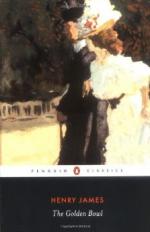“Yes,” Fanny Assingham cooed, “understands—?”
“Well, what I want. I want a happiness without a hole in it big enough for you to poke in your finger.”
“A brilliant, perfect surface—to begin with at least. I see.”
“The golden bowl—as it was to have been.” And Maggie dwelt musingly on this obscured figure. “The bowl with all our happiness in it. The bowl without the crack.”
For Mrs. Assingham too the image had its force, and the precious object shone before her again, reconstituted, plausible, presentable. But wasn’t there still a piece missing? “Yet if he lets you alone and you only let him—?”
“Mayn’t our doing so, you mean, be noticed?—mayn’t it give us away? Well, we hope not—we try not—we take such care. We alone know what’s between us—we and you; and haven’t you precisely been struck, since you’ve been here,” Maggie asked, “with our making so good a show?”
Her friend hesitated. “To your father?”
But it made her hesitate too; she wouldn’t speak of her father directly. “To everyone. To her—now that you understand.”
It held poor Fanny again in wonder. “To Charlotte—yes: if there’s so much beneath it, for you, and if it’s all such a plan. That makes it hang together it makes you hang together.” She fairly exhaled her admiration. “You’re like nobody else—you’re extraordinary.”
Maggie met it with appreciation, but with a reserve. “No, I’m not extraordinary—but I am, for every one, quiet.”
“Well, that’s just what is extraordinary. ‘Quiet’ is more than I am, and you leave me far behind.” With which, again, for an instant, Mrs. Assingham frankly brooded. “’Now that I understand,’ you say—but there’s one thing I don’t understand.” And the next minute, while her companion waited, she had mentioned it. “How can Charlotte, after all, not have pressed him, not have attacked him about it? How can she not have asked him—asked him on his honour, I mean—if you know?”
“How can she ‘not’? Why, of course,” said the Princess limpidly, “she must!”
“Well then—?”
“Well then, you think, he must have told her? Why, exactly what I mean,” said Maggie, “is that he will have done nothing of the sort; will, as I say, have maintained the contrary.”
Fanny Assingham weighed it. “Under her direct appeal for the truth?”
“Under her direct appeal for the truth.”
“Her appeal to his honour?”
“Her appeal to his honour. That’s my point.”
Fanny Assingham braved it. “For the truth as from him to her?”
“From him to any one.”
Mrs. Assingham’s face lighted. “He’ll simply, he’ll insistently have lied?”
Maggie brought it out roundly. “He’ll simply, he’ll insistently have lied.”
It held again her companion, who next, however, with a single movement, throwing herself on her neck, overflowed. “Oh, if you knew how you help me!”




